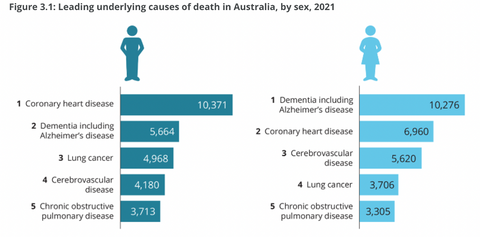In the diagram below, you will see that coronary heart disease and Dementia are the two leading causes of death, for both men and women, in Australia.
It’s also important to note that chronically elevated blood glucose levels increases your risk of developing Dementia and Alzheimer’s disease by a whopping 80 percent!
The good news? While common and often undiagnosed for many years, both insulin resistance and elevated blood glucose levels are reversible.
It’s important to be aware of their impact to allow you to make informed lifestyle decisions. Keep reading to find out more…

Heart Disease and insulin resistance
Insulin resistance has been strongly associated with hypertension (high blood pressure). The explanation of the association between insulin resistance and blood pressure include increased sympathetic nervous system activity, proliferation of vascular smooth cells and increased sodium reabsorption.
The risk of coronary heart disease (CHD) is influenced by family history, insulin sensitivity and diet. Adiposity (overweight & obesity) affects both CHD and insulin sensitivity.
Heart Foundation Statistics
- Cardiovascular disease (CVD) causes 1 in 4 deaths
- CVD kills 118 people every day, or 1 person every 12 minutes
- Almost 2 in 3, or 12 million Australians are overweight or obese.
- Eating 5+ vegetables a day reduces the risk of CVD by 17%.
- A staggering 9 out of 10 people don’t eat enough vegetables.
- 4 out of 5 people don’t complete enough physical activity. With the aim to be active 5 of more days each week for a total of 2.5 hours each week.
- Most CVD risk factors are preventable through a healthy lifestyle (healthy diet, regular exercise, and maintaining a healthy weight)
Australian Institute of Health and Welfare
- The leading risk factor contributing to the total CVD burden in 2018 was high blood pressure.
Metabolic Syndrome is not a single disease, but a complex cluster of symptoms including elevated waist circumference, hypertension (high blood pressure), hyperglycaemia (high blood glucose), dyslipidaemia (cholesterol/lipids) and insulin resistance, all of which are commonly associated with increased risk of obesity and Type 2 diabetes.
Metabolic syndrome and CVD share common pathways including increased oxidative stress, defective glucose, lipid metabolism, low grade inflammation, increased blood clotting and damage to the cells that line arterial walls.
Recent studies have demonstrated that insulin resistance can develop not only in the classic insulin responsive tissues, but also in cardiovascular tissues where insulin participates in the development of CVD and hypertension.
Overweight link
When the capacity for safe lipid (fat) storage in our fat cells is exceeded, lipids overflow to non-adipose tissue, increasing the risk for chronic, low-grade inflammation and subsequent insulin resistance, hypertension and metabolic syndrome.
Excess adipose tissue (stored body fat) is an overactive endocrine organ secreting an array of inflammatory substances, which inhibit insulin signalling and further exacerbate insulin resistance.
In summary, focus on your metabolic health is paramount for longevity and quality of life. While genetic predisposition can make us more vulnerable to metabolic disease, your diet and lifestyle choices play an integral role.
























